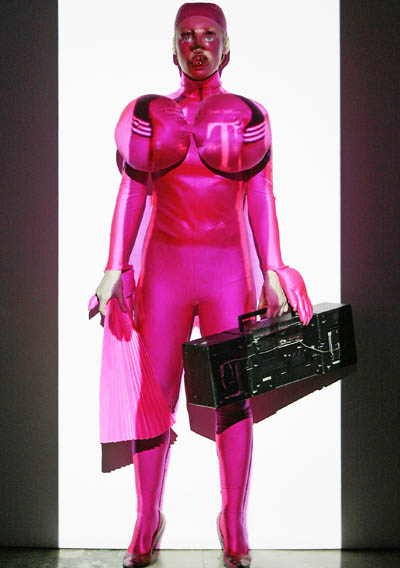 Sabine Reinfeld: Frau Berlin Performance Courtesy of the artist Lost & Found Von Verlusten und Strategien der kulturellen Selbstermächtigung Pauline Boudry, Anna McCarthy, Discoteca Flaming Star & François Boué, Luke Fowler & Kosten Koper, Stella Glitter, Melissa Gordon, Grrrl Zine Network (Elke Zobl & Haydeé Jiménez), Annette Kelm, Jutta Koether, Didi Neidhart, Sabine Reinfeld, Aurora Reinhard, Dimitrina Sevova, Andrea Thal, Anne-Käthi Wehrli Click for English text "Lost & Found" ist eine Ausstellung über Pop. Es ist eine Ausstellung darüber, wie Künstlerinnen und Künstler mit einem Gegenstand umgehen, bei dem die Grenze zwischen Aneignung und Vereinnahmung schnell verwischen. "Lost & Found" handelt von bitter beklagten Verlusten und freudig geteilten Entdeckungen. "Lost" - das bedeutet den Verlust von Widerspenstigkeit und von glamouröser Überschreitung. Beides scheint nur noch wehmütige Erinnerung, seit Pop an den Alltag verloren ging. "Found" - das sind die emanzipative Umcodierung und die begeisterte Verbreitung von popkulturellen Fragmenten. Sie kommen aus aller Welt und halten für alle etwas bereit. Der schwindenden Definitionsmacht von Musik-, Film- und KulturredakteurInnen über das, was gut, neu, subversiv, progressiv usw. ist, stehen diversifizierte Verbreitungskanäle wie Tauschbörsen, Weblogs und Podcasts, etc. gegenüber. Wir, die wir früher fleissig Mixtapes aufgenommen und darüber auch Meinungen ausgetauscht haben und die diese Themen nach wie vor relevant finden, tauschen heute Daten hin und her, was uns für kurze Zeit mit den Leuten die diese Daten mit uns tauschen, verbindet. Aber teilen wir mit ihnen, den Unbekannten, nur noch die Daten oder auch politische Vorstellungen? Ausgehend davon fragen wir: Wo lässt sich heute die Politisierung eines Individuums über die Rezeption als auch die Produktion festmachen? Wo lässt sich ein antihegemonialer Lebens- und/oder Genderentwurf und wo lassen sich feministische Anliegen in kulturellen Produktionen verorten? "Lost & Found" richtet den Blick bewusst unnostalgisch darauf, wie kulturelle Produktionen aktiv rezipiert werden und darauf, was aktuelle Möglichkeiten der kulturellen Selbstermächtigung sind. Die KonsumentIn als KulturproduzentIn eröffnet einen produktiven Raum, in dem mit subjektivem Blick Popwerke wiederentdeckt und feministisch - queer (um)interpretiert werden. Dabei geht es auch darum eine alternative Geschichtsschreibung und popfeministische Netzwerke in das kulturelle Gedächtnis einzuschreiben. Konzeption und Organisation: Alice Cantaluppi, Isabel Reiss, Anna Voswinckel Ausstellungsdauer 12.5. - 15.7.2007 Öffnungszeiten Mi/Fr 14 - 17 Uhr, Do 14 - 21 Uhr, Sa/So 14 - 20 Uhr Shedhalle Rote Fabrik Seestrasse 395 8038 Zürich Telefon +41 (0)44 481 59 50 Fax +41 (0)44 481 59 51 Email info@shedhalle.ch www.shedhalle.ch Lost & Found Of the Losses and Strategies of Cultural Self-Empowerment Pauline Boudry, Anna McCarthy, Discoteca Flaming Star & François Boué, Luke Fowler & Kosten Koper, Stella Glitter, Melissa Gordon, Grrrl Zine Network (Elke Zobl & Haydeé Jiménez), Annette Kelm, Jutta Koether, Didi Neidhart, Sabine Reinfeld, Aurora Reinhard, Dimitrina Sevova, Andrea Thal, Anne-Käthi Wehrli "Lost & Found" takes a look at the reception of cultural productions and with it those current possibilities of cultural self-empowerment which arise out of an engagement with a song, a work, an individual's life plan or the appropriation of "mainstream". Emulation, new and reinterpretation as well as allusive referencing play key roles. While these are of course important to any cultural production, here they are placed in the foreground and disclosed. "Lost" refers to the longing to become part of a larger meaningful community that takes a critical attitude towards the zeitgeist and the events of the day and represents this stance publicly. Rebelling against social norms and appellations, and in doing so gaining a position through disengagement and demarcation from the "establishment" on the one hand and declaring solidarity with kindred spirits on the other, was - so a historical perspective - a means of generating a perspective on one's opponent and self into the 1990s. Youth culture movements which formulated countercultural claims and developed their own system of values and norms, for instance punk, later hardcore punk and particularly straight edge, old school hip hop or riot grrls, only briefly reached a broad public and are already disappearing. Today an eclectic, post-modern potpourri is the starting point: everyone is sampling, copying, nabbing, reinterpreting, etc. With this observation we do not want to join the choir of cultural pessimists but rather point out current practices and forms of cultural production which disclose options of cultural self-empowerment. "Found" therefore means the active reception of the vast array of propositions circulating globally and their individual appropriation and staging, which have supplanted collective spirit and its concomitant visions of the enemy. Taking this as our starting point, we ask: where can we detect the politicisation of an individual through reception and production? Where can we locate an anti-hegemonic life or gender project and feminist concerns in cultural productions? The diminishing power of music, film and cultural editors in the media to define what is good, new, subversive and progressive confronts diversified dissemination channels like swap exchanges, weblogs and podcasts etc. Nonetheless, collector's editions of opinion-potent media still generate good sales figures. They are pitched demographically and economically at specific target groups who do not take the time to search for anything new but are rather interested in acquiring a vague, culturally surplus feeling of being alive. We, who once busily recorded mixed tapes, swapped opinions about them and still find these themes relevant, shift data and files back and forth, for a short time linking us to the people we exchange with. But do we share with them, the unknown ones, only the data and files or political ideas as well? Conception & Organisation: Alice Cantaluppi, Isabel Reiss, Anna Voswinckel Exhibition 12 May - 15 July 2007 Opening hours Wed/Fri 2 - 5 pm, Thur 2 -9 pm, Sat/Sun 2 - 8 pm |